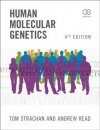Textbook
Out of Print
By: Tom Strachan(Author), Andrew Read(Author)
800 pages, 450 colour illustrations
![Human Molecular Genetics Human Molecular Genetics]()
Click to have a closer look
About this book
Contents
Biography
Related titles
About this book
Human Molecular Genetics is an established and class-proven textbook for upper-level undergraduates and graduate students which provides an authoritative and integrated approach to the molecular aspects of human genetics. While maintaining the hallmark features of previous editions, the Fourth Edition has been completely updated. It includes new Key Concepts at the beginning of each chapter and annotated further reading at the conclusion of each chapter, to help readers navigate the wealth of information in this subject.
The text has been restructured so genomic technologies are integrated throughout, and next generation sequencing is included. Genetic testing, screening, approaches to therapy, personalized medicine, and disease models have been brought together in one section. Coverage of cell biology including stem cells and cell therapy, studying gene function and structure, comparative genomics, model organisms, noncoding RNAs and their functions, and epigenetics have all been expanded.
Contents
PART 1: THE BASICS OF DNA, CHROMOSOMES, CELLS, AND DEVELOPMENT
1. Nucleic Acid Structure and Gene Expression
2. Chromosome Structure and Function
3. Genes in Pedigrees and Populations
4. Cells and Cell-Cell Communication
5. Principles of Development
PART 2: ANALYZING THE STRUCTURE AND EXPRESSION OF GENES AND GENOMES
6. Amplifying DNA: Cell-based DNA Cloning and PCR
7. Nucleic Acid Hybridization: Principles and Applications
8. Analyzing the Structure and Expression of Genes and Genomes
PART 3: INVESTIGATING THE HUMAN GENOME AND ITS RELATIONSHIP TO OTHER GENOMES
9. Organization of the Human Genome
10. Model Organisms, Comparative Genomics and Evolution
11. Human Gene Expression
12. Studying Gene Function in the Post-Genome Era
PART 4: HUMAN GENETIC VARIATION AND DISEASES
13. Human Genetic Variability and its Consequences
14. Genetic Mapping of Mendelian Characters
15. Mapping Genes Conferring Susceptibility to Complex Disease
16. Identifying Human Disease Genes and Susceptibility Factors
17. Cancer Genetics
PART 5: APPLIED HUMAN MOLECULAR GENETICS
18. Genetic Testing of Individuals
19. Pharmacogenetics, Personalized Medicine, and Population Screening
20. Genetic Manipulation of Animals for Modeling Disease and Investigating Gene Function
21. Genetic Approaches to Treating Disease
Glossary
Index
Customer Reviews
Biography
Tom Strachan is Scientific Director of the Institute of Human Genetics and Professor of Human Molecular Genetics at Newcastle University, UK, and is a Fellow of the Academy of Medical Sciences and a Fellow of the Royal Society of Edinburgh. Tom's early research interests were in multigene family evolution and interlocus sequence exchange, notably in the HLA and 21-hydroxylase gene clusters. While pursuing the latter, he became interested in medical genetics and disorders of development. His most recent research has focused on developmental control of the vertebrate cohesion regulators Nipbl and Mau-2.
Andrew Read is Emeritus Professor of Human Genetics at the University of Manchester, UK and a Fellow of the Academy of Medical Sciences. Andrew has been particularly concerned with making the benefits of DNA technology available to people with genetic problems. He established one of the first DNA diagnostic laboratories in the UK over 20 years ago (it is now one of two National Genetics Reference Laboratories), and was founder chairman of the British Society for Human Genetics, the main professional body in this area. His own research is on the molecular pathology of various hereditary syndromes, especially hereditary hearing loss. Drs. Strachan and Read were recipients of the European Society of Human Genetics Education Award.
Textbook
Out of Print
By: Tom Strachan(Author), Andrew Read(Author)
800 pages, 450 colour illustrations
Praise for the Third Edition:
"This book is an excellent companion for students in human genetics or for researchers that want to gain background and knowledge in this field."
- Human Genetics Journal
"[Human Genetics] is a well-crafted piece that will entertain and educate interested readers [...] .Lewis uses vibrant language and insightful allegories to explain difficult scientific concepts [...] .It is certainly an up-to-date account of this quickly evolving field." - Quarterly Review of Biology


































